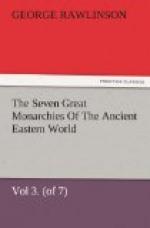It has been said that this conception of Ahura-mazda as the Supreme Being is “perfectly identical with the notion of Elohim, or Jehovah, which we find in the books of the Old Testament.” This is, no doubt, an over-statement. Ahura-mazda is less spiritual and less awful than Jehovah. He is less remote from the nature of man. The very ascription to him of health (haurvat) is an indication that he is conceived of as possessing a sort of physical nature. Lucidity and brilliancy are assigned to him, not (as it would seem) in a mere metaphorical sense. Again, he is so predominantly the author of good things, the source of blessing and prosperity, that he could scarcely inspire his votaries with any feeling of fear. Still, considering the general failure of unassisted reason to mount up to the true notion of a spiritual God, this doctrine of the early Arians is very remarkable; and its approximation to the truth sufficiently explains at once the favorable light in which its professors are viewed by the Jewish prophets, and the favorable opinion which they form of the Jewish system. Evidently, the Jews and Arians, when they became known to one another, recognized mutually the fact that they were worshippers of the same great Being. Hence the favor of the Persians towards the Jews, and the fidelity of the Jews towards the Persians. The Lord God of the Jews being recognized as identical with Ormazd, a sympathetic feeling united the peoples. The Jews, so impatient generally of a foreign yoke, never revolted from the Persians; and the Persians, so intolerant, for the most part, of religions other than their own, respected and protected Judaism.
The sympathy was increased by the fact that the religion of Ormazd was anti-idolatrous. In the early nature-worship idolatry had been allowed; but the Iranic system pronounced against it from the first. No images of Ahura-mazda, or of the Izeds, profaned the severe simplicity of an Iranic temple. It was only after a long lapse of ages that, in connection with a foreign worship, idolatry crept in. The old Zoroastrianism was in this respect as pure as the religion of the Jews, and thus a double bond of religious sympathy united the Hebrews and the Arians.




